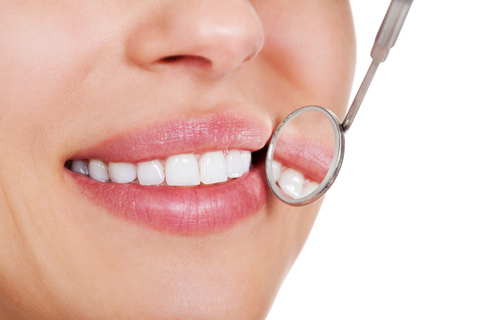March 4th, 2014

Many of our patients at Princeton Restorative & Implant Dentistry have been asking us about brightening their teeth lately, and today we thought we would discuss the options available to you to put the sparkle back in your smile!
Over-the-counter products – You’ve probably seen over-the-counter whiteners such as whitening strips on store shelves. While whitening strips may work for some, they do have certain restrictions. For example, they are not nearly as effective when crowns or fillings are involved. Teeth that are stained gray instead of brown or yellow typically don’t respond as well to these types of whiteners. Whitening strips typically save you money but take longer to work and also require discipline on your part to keep them in place for the right amount of time each day.
Whitening at our office – This type of whitening can be done right at Princeton Restorative & Implant Dentistry. A whitening agent is applied directly to teeth and a special light helps accelerate the whitening process. This may be accomplished in one session or take several appointments. You should expect to spend anywhere from 30 to 60 minutes at each session. If you have a mix of natural teeth and fillings or crowns, Dr. Stephen Hudis may recommend bonding or veneers on your natural teeth instead of regular bleaching. Teeth whitening at our office can be used to correct many tooth discolorations which may have been caused by staining, aging, or chemical damage to teeth. Using the latest in whitening technology, we can offer a safe method for creating the beautiful smile you've always wanted.
At-home whitening – If you choose this option, Dr. Stephen Hudis will take a mold of your teeth and create a custom-fit whitening tray. Gel whitening solution is poured in the mouthguard-like tray, and the tray is worn for a pre-determined amount of time, generally from a couple of hours a day to every day during the night, until you’re back in our office for an evaluation.
Give us a call at our convenient Princeton, NJ office to schedule an appointment! Whiter teeth are one just one visit away at Princeton Restorative & Implant Dentistry!
February 25th, 2014

The average adult has 32 teeth, a combination of molars, canines, and incisors. By middle age, however, most adults are missing at least one tooth due to an injury, decay, or gum disease. Though many people choose to forgo tooth replacement, Dr. Stephen Hudis and our team at Princeton Restorative & Implant Dentistry will tell you that every tooth is important. Each plays a vital role in the structure of the mouth and in relationship to the remaining teeth. Leaving the space where a tooth once stood can have serious consequences. There are many reasons why severely decayed or missing teeth should be replaced as quickly as possible.
- Speech: A missing tooth can negatively affect the way you speak, depending on its location.
- Bite changes: The loss of one or more teeth can cause the redistribution of bite pressure onto other teeth. Over time, this can cause the teeth to shift and move into the space the tooth once held.
- Gum disease: Shifting teeth can make it easier for plaque to accumulate in hard-to-reach places. This can increase the risk of gum disease, which can lead to additional tooth loss.
- Bone loss: The teeth are place-holders in the jaw. When one falls out and is not replaced, the bone that once surrounded it begins to deteriorate and wear down.
- Aesthetics: A missing tooth leaves a visible gap between the teeth and can be a source of embarrassment and insecurity.
Advancements in modern dentistry have made it easy to replace missing teeth using natural-looking and functioning prosthetics. Dental implants are permanent solutions for replacing missing teeth with the use of special rods that are anchored in the jaw bone. These implants serve as artificial tooth roots that fuse with the jaw over time. When cared for properly, most dental implants can be fitted to last a lifetime.
To learn more about dental implants, or to schedule an appointment with Dr. Stephen Hudis, please give us a call at our convenient Princeton, NJ office!
February 18th, 2014

Did you know there are as many types of dental fillings as there are flavors of ice cream? Okay, maybe that’s an exaggeration. Still, when you visit the dentist with a cavity, there are many filling options. Most of us just sit in the chair, open our mouths, and let the dentist work his or her magic. But have you ever stopped to consider what the dentist is filling and restoring your decayed or broken tooth with?
Five types of dental fillings
There are five basic kinds of dental filing material. The dentist decides which type to use based on the degree of the decay, the cost of the material, and the type of dental insurance you have.
- Dental amalgam, or silver fillings, have been used to fill cavities for more than 150 years. Dental amalgam is the most common type of dental filling. It's strong, durable, and less expensive than other types.
- Composite fillings, or white fillings, are popular because the color matches the rest of your teeth. Composite fillings are a combination of resin and plastic. They are more aesthetically pleasing than silver fillings, but are also less durable.
- Ceramic fillings are durable and visually appealing (tooth-colored), but they are expensive. They are made of porcelain and have been shown to be resistant to staining.
- Glass ionomers are typically used on children whose teeth are still changing. Constructed from glass and acrylic, glass ionomers are designed to last fewer than five years. The benefit of these dental fillings is that they release fluoride, which protects the changing tooth from further decay.
- Unless you’re a rock or movie star, gold fillings aren’t common. While a gold filling is durable, non-corrosive, and can last more than 15 years, it not only takes more than one dental visit to place, but, as you can imagine, it is expensive.
For more information about fillings, or to schedule an appointment with Dr. Stephen Hudis, please give us a call at our convenient Princeton, NJ office!
February 4th, 2014

The American Academy of Periodontology stresses the importance of good oral health since gum disease may be linked to heart disease and stroke. Thus far, no cause-and-effect relationship has been established, but there are multiple theories to explain the link between heart disease and periodontal disease. One theory suggests that oral bacteria may affect heart health when it enters the blood and attaches to the fatty plaque in the heart's blood vessels. This can cause the formation of blood clots. Another theory suggests the possibility that inflammation could be a contributing link between periodontal disease and heart disease. Gum disease increases plaque buildup, and inflamed gums may also contribute to the development of swollen or inflamed coronary arteries.
What is coronary artery disease?
Coronary artery disease is caused in part by the buildup of fatty proteins on the walls of the coronary arteries. Blood clots cut off blood flow, preventing oxygen and nutrients from getting to the heart. Both blood clots and the buildup of fatty proteins (also called plaque) on the walls of the coronary arteries may lead to a heart attack. Moreover, periodontal disease nearly doubles the likelihood that someone will suffer from coronary artery disease. Periodontal disease can also worsen existing heart conditions, so many patients who suffer from heart disease need to take antibiotics before any dental procedures. This is especially true of patients who are at greatest risk for contracting infective endocarditis (inflammation of the inner layer of the heart). The fact that more than 2,400 people die from heart disease each day makes it a major public health issue. It is also the leading killer of both men and women in the United States today.
What is periodontal disease?
Periodontal disease is a chronic inflammatory disease that destroys the bone and gum tissues around the teeth, reducing or potentially eradicating the system that supports your teeth. It affects roughly 75 percent of Americans, and is the leading cause of adult tooth loss. People who suffer from periodontal disease may notice that their gums swell and/or bleed when they brush their teeth.
Although there is no definitive proof to support the theory that oral bacteria affects the heart, it is widely acknowledged better oral health contributes to overall better health. When people take good care of their teeth, get thorough exams, and a professional cleaning twice a year, the buildup of plaque on the teeth is lessened. A healthy, well-balanced diet will also contribute to better oral and heart health. There is a lot of truth to the saying "you are what you eat." If you have any questions about you periodontal disease and your overall health, give our Princeton, NJ office a call!








